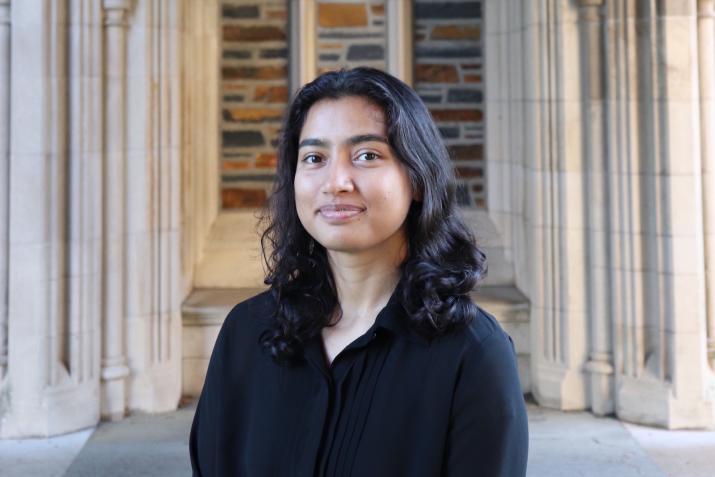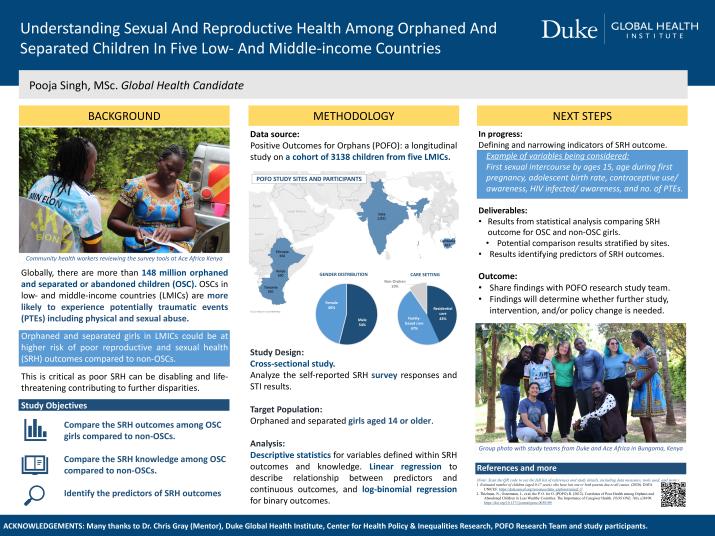Understanding Sexual And Reproductive Health Among Orphaned And Separated Children In Five Low- And Middle-income Countries

Project member(s):
-
Pooja Singh
Faculty mentor:
Community partners:
-
Positive Outcomes for Orphans (POFO) Research Team, including: Bernard Agala; Cyrilla Amanya at Ace Africa Kenya, Bungoma, Kenya; Vanreak Vann, Somavatey Thy, and Seyha Nym, Sophary Ros, and Lina Luom at Development for Cambodian Children and Mao Lang at
Homeland in Battambang, Cambodia; Dean Lewis, Venkata Gopala Krishna Kaza and Senti Moa with Sahara Centre in New Delhi, India; and Berhanu Kenea, Wosene Mola, Desalegn Sisay, Beniyam Gebre-hiwot, Lema Debela at Stand for Vulnerable Organization in Addis Ababa, Ethiopia; and Karen O’Donnell.
- Feedback? Contact the team
Understanding Sexual And Reproductive Health Among Orphaned And Separated Children In Five Low- And Middle-income Countries
Project overview
Globally, more than 148 million children (0-17 years) have lost one or both parents, and millions more have been abandoned or separated. Children in lower and middle-income countries (LMIC) are at higher risk of orphaning or separation. This is alarming as OSCs in LMIC are also at higher risk of potentially traumatic events (PTE) such as physical and sexual abuse which is further associated with poor physical and mental health outcomes.2,3 Given the high rates of PTE and potentially resource-limited circumstances including limited education among OSC in LMIC, adolescent girls could be more vulnerable to poor reproductive and sexual health outcomes including early pregnancy and related maternal morbidities, high-risk sexual behavior, HIV/AIDS, and sexually transmitted diseases (STDs) – all of which can be disabling or life-threatening. Currently, there is a lack of literature that addresses this global issue in a cross-cultural setting. This study aims to understand the risk of adverse sexual and reproductive health outcomes among the OSCs compared to non-OSC and identify their predictors. This study will use data from the Positive Outcomes for Orphans (POFO) study that followed a cohort of 3000 children in Ethiopia, Cambodia, Kenya, India, and Tanzania since 2006. The study will conduct quantitative analysis including descriptive statistics and both linear and logistical regression on the self-reported survey responses from nearly 990 females aged 16 or older in the POFO cohort. Due to the pandemic and recent regional conflicts including in Ukraine and Syria, many more children have been orphaned and separated exposing more girls to a potentially higher risk of PTE and adverse health outcomes. The findings from this can be essential in informing leaders and policies to provide the services needed to support young girls and reduce adverse reproductive and sexual health outcomes, and maybe even PTE in the long run.
Media and resources
Last updated on June 26, 2023


